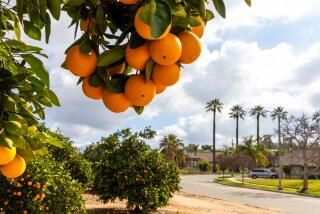North German Orchard Owners Losing Ground
- Share via
JORK, Germany — The tree huggers of the world will be forgiven for feeling confused about the latest clash with those wielding chain saws, as the orchards that have graced this corner of northern Germany for 700 years are being felled in the name of environmental protection.
The Altes Land orchards that account for one-third of Germany’s fruit output are nurtured by an intricate web of water channels that were carved from the Elbe River flood plain in the 13th century by Dutchmen brought in to help reclaim the low-lying farmland.
The dikes and rivulets have long lent the region the charm and serenity of the Netherlands, but the pastoral peace is being shattered this month as farmers felled the first of as many as 750,000 fruit trees that will be removed because they are too close to the water’s edge.
It is the latest blow to a domestic food industry already devastated by crises in meat production, and the irony is not lost on orchard owners who have for years practiced environmentally sensitive farming despite being only a few hundred yards from heavily polluting industries across the Elbe. The metropolis of Hamburg sprawls on the opposite shore, bristling with smokestacks, aluminum plants, round-the-clock traffic jams and a busy airport spewing far more harmful elements into the air and water than do the trees.
Ahrend Schuback’s family has grown apples and sour cherries in Altes Land since the 1400s, but 1,000 of his trees have to be removed before he can apply this season’s coating of natural herbicides. That is only a fraction of the 40,000 trees in his orchard but enough to ensure that this year will be another losing venture.
“Every tree we take out of production comes straight out of our income, as we don’t have any European Union subsidies or compensation for orchards,” said the young farmer who has lost faith in horticulture as a means to make a living. “We’ve been bumping up against the survival limit for years, and this is just the shove we need to go under.”
Ines Reyhe is the seventh generation of her family to tend a nearby orchard and fears that she will be the last, as more than 10% of her 45,000 fruit trees have to be removed to comply with new regulations mandating a 16-foot setback from the water.
“It was always considered an advantage to have so much of the plantation bordering the canals,” she said, more bemused than bitter. “You have to wonder if maybe agriculture just isn’t an option anymore in a densely populated, industrial country like we have.”
Farming is fast becoming a niche industry in Germany, where less than 5% of the gross domestic product originates from farmland. The nation’s food producers face competition from lower-wage countries with wide-open spaces and less regulation. With the recent outbreak of “mad cow” disease and worries about the foot-and-mouth virus, edicts like the waterfront setback are driving farmers to conclude that they are engaged in a lost cause.
Germany produces less than 9% of the fruit in the EU, and Altes Land’s 330,000-ton annual output from 11 million trees can easily be replaced with cheap foreign imports, the farmers readily concede.
Karl-Heinz Tiemann has served as county research director and plantation advisor for more than a quarter of a century and insists that the “integrated farming” methods employed by Altes Land’s 1,000 orchard enterprises ensure that water quality in the already polluted Elbe is not further damaged. Chemical sprays are eschewed in favor of natural herbicides to control fungus, and routine testing shows water runoff to be benign, Tiemann says.
“My heart goes out to the farmers, not the bureaucrats,” he said. “No one understands better than these people here that you can’t survive as a farmer if you don’t live in harmony with nature.”
But the stricter water-protection laws offer no avenue of appeal, so farmers such as Reyhe whose land is planted in narrow fingers flanked by canals have no choice but to chop down their offending trees or face stiff fines or even impoundment.
“What is happening to the farmers here is a consequence of well-meaning people in the government imposing rules aimed at water protection but without any consideration for the exceptions where no risks to drinking water apply,” said Joerg Hilbers, a government horticultural monitor for the region. “In this climate of fear spawned by the mad cow crisis and other health scares, no one is brave enough to acknowledge that there might be grounds for allowing exceptions.”
More to Read
Sign up for Essential California
The most important California stories and recommendations in your inbox every morning.
You may occasionally receive promotional content from the Los Angeles Times.










